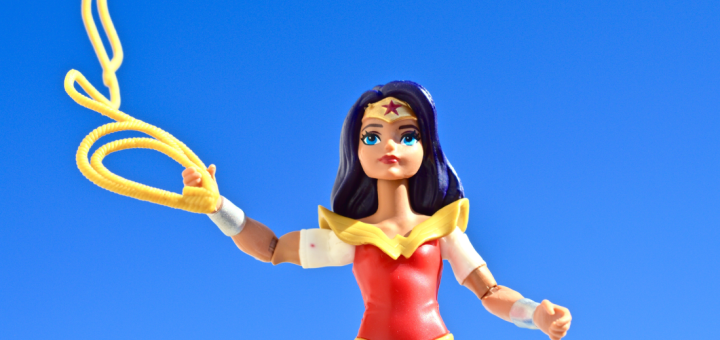Let me start out with an admission: I am an unabashed fangirl of DC comics’ pantheon of characters. Ever since I secretly watched Batman: The Animated Series in my parents’ basement, I adored every hero (and some of the villains) DC produced. I still occasionally watch Justice League Unlimited as a special treat to myself. So, let’s just say I expressed more than a little excitement when DC and Warner Brothers announced Wonder Woman’s emergence onto the silver screen for Patty Jenkin’s 2017 film Wonder Woman, which I believe adheres fairly well to this character’s essence.*
Admiration is one thing; but why would a rabbi laud a Greek-myth-inspired pop culture icon? It boils down to three things.
First, love.
I do not mean romantic love. Yes, that is in this film, but most of all, love of family and love of humanity drive Diana. Her love evolves, starting simply and then eventually acknowledging humanity’s complexity and imperfections. She sees humanity’s darknesses, and consequently, experiences disappointment. Nonetheless, she still loves the human race. That love drives her to reexamine her own choices and capabilities. It deepens her understanding of herself and as a result, her powers amplify. This is not totally dissimilar to how the Bible sees love. In the Torah, the word love first occurs not between romantic partners, but as God’s description of a familial relationship, between a parent and a child (Genesis 22:2). Later usage of love includes romance (for example, Genesis 29:32), but it also commands how strangers should treat one another (Leviticus 19:18). It even defines humanity’s relationship to the divine (Deuteronomy 6:5) and God’s attachment to humanity (Deuteronomy 7:9). These different kinds of love characterize Wonder Woman as well; they turn her from a specially trained individual with powerful abilities into a hero.
Second, wonder.
Her power levels are equal to Superman, and she is a better trained fighter than Batman. However, Princess Diana of Themyscira is not just wonderful. She is full of wonder. Throughout the movie, Wonder Woman sees the world through fresh eyes. This enables her to experience a whole rainbow of feelings, earnestly and fully. Indeed, sorrow washes over her, but joy and happiness flood her as well. In his commentary on Genesis 9, the 11th century scholar Rashi connects the concepts of wonder and awe to the Hebrew word for life. I love this connection; when we open ourselves to wonder, to awe, even to fear, life becomes more vivid. Particularly throughout this film, we witness Wonder Woman’s understanding of life deepening and blossoming with each new experience in the greater world.
Third, values.
Wonder Woman consistently follows her heart; she makes every attempt to adhere to the traditions which guided her formative lessons. Her values propel her choices. In modern parlance, she lives a purpose-driven life. In her final conversation with her mother, Hippolyta begs Diana to remain on the Amazonian island; in return, the princess asks “but if I stay, who will I be?” This moment contains echoes of Rabbi Hillel’s famous statement “If I am only for myself, what am I?” in Pirke Avot 1:14. Wonder Woman knows that if she refuses to help when she can, she will betray not just others, but also herself. Her values guide her heroism.
When we empower ourselves to live according to our values, continuously seeing wonder in the world around us, and allowing love to color our choices, we set ourselves on a path of living as best as we can. We guide the hero that resides within all of us to emerge. And in this way, any person can become Wonder Woman.
*Granted, there have been many versions of this 75-year-old character, including some terrible re-imaginations during 1990s when she was forced into biker shorts after losing her title to Artemis.







Comments are moderated and will not appear immediately.